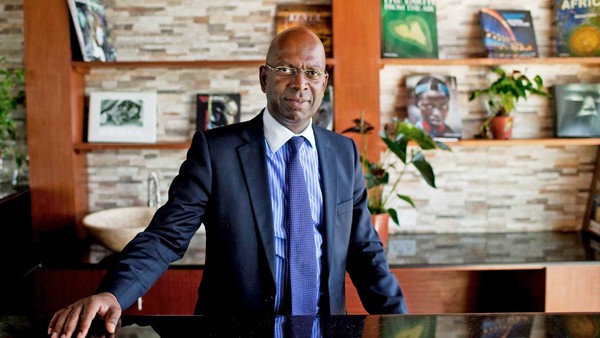From Oil Painter to the C-Suite
FT.com Feb 25, 2013
By Katrina Manson
http://www.ft.com/cms/s/0/c62c...0.html#ixzz2Ly4ynCad
Mother knows best: Bob Collymore spent his time painting until his mother said she would evict him unless he got a serious job
. . . As head of Safaricom, which is 40 per cent owned by Vodafon of the UK, the 55-year-old leads a company seen as a national institution but that is often accused of monopolistic tendencies. Mr Collymore uses the word “dominant” before correcting himself. “Why don’t we call it ubiquitous ... I think that’s a nice word.”
For the Guyana-born Mr Collymore, this means he is a celebrity. “They put this whole celebrity thing on me here ... you don’t have a choice. I can’t imagine many corporate leaders in any other part of the world – Richard Branson maybe – who are instantly recognised,” he says . . .
Safaricom has 19m customers in a country of 44m, which translates to nearly every adult. It reported revenues of KSh116.5bn ($1.3bn) last year and has developed an international reputation for innovation . . .
Mr Collymore, who watches Kenya’s evolving political scenarios as if he is a citizen himself, has made quick work of becoming a national champion, and regularly appeals to national sentiment despite his British-Guyanan background. “Now I say, ‘me I’m Kenyan, me’,” he says, teasing out a typical turn of phrase. Many Kenyans seem to appreciate his efforts: he was awarded the Moran of the Burning Spear by the president last year – a prize rarely given to foreigners – was presented with a goat for his birthday and is often urged to get “a piece of land” in keeping with local tradition.
Mr Collymore’s ability to adapt to new contexts was nurtured from an early age. He was raised by his grandparents in Guyana for 12 years and when he was 16 his mother, who had moved to the UK, brought him to join her in London. As the only black child in his class, he tried to be “wallpaper” to avoid getting beaten up. “I didn’t even know what the word ‘wog’ was until I got there. I didn’t know what racial abuse was,” he says.
After school, he had to forgo a place at Warwick University because he was not eligible for funding. “I wanted to go to university and I disliked not having gone and for some years after I wished I’d gone,” he says. “Now it doesn’t matter, [but] I would always advise a young person to go to the best university you can find.”
When graduates ask for his advice, however, he preaches the value of being able to adapt, an attribute that has driven his own career. Unable to pursue a degree, Mr Collymore spent his time filling forms as a junior underwriter and working as a train announcer while pursuing his passion for “surrealist stuff”.
Were it not for his mother, he might still be selling his oil paintings along the railings of Hyde Park. But she joked she would evict him unless he got a serious job and got him an interview at British Telecom, where she worked. He was given an entry-level job as a clerical officer.
His career took off when he joined the UK’s Cellnet in 1993, just as the corporate world was starting to venture into mobile telephony. “I was walking down a path no one else had walked and I thought, ‘this is good because the rules aren’t written and I’m just going to make the rules up as I go’,” he says. “We took some risks. This change thing – it is actually quite exciting, it’s good, and you will make mistakes and you will stumble and fall and that’s quite neat.”
The hankering after new ground and love of adaptability has served him well. “I didn’t go to the smart university; this is probably the only thing which has ever distinguished me,” he says. “Nothing beats this job.”
The CV
Born:1958 in Guyana
Education: Selhurst High School for Boys, London
Career: 1978 Joins British Telecom
1993 Appointed manager of handset strategy, Cellnet
1994 Becomes purchasing director, Dixons Stores Group
1998 Appointed handset purchasing director, Vodafone UK; later appointed to head the group’s global handset purchasing
2003 Moves to Japan to manage the integration of J-Phone into the Vodafone Group
2006 Becomes governance director for Africa, Vodafone, and to boards of Vodacom Group, Safaricom and boards of several other Vodacom subsidiaries
2009 Named as chief officer, corporate affairs, Vodacom
2010 Appointed chief executive of Safaricom
Family: Separated, two children
Interests: Flying helicopters and music

